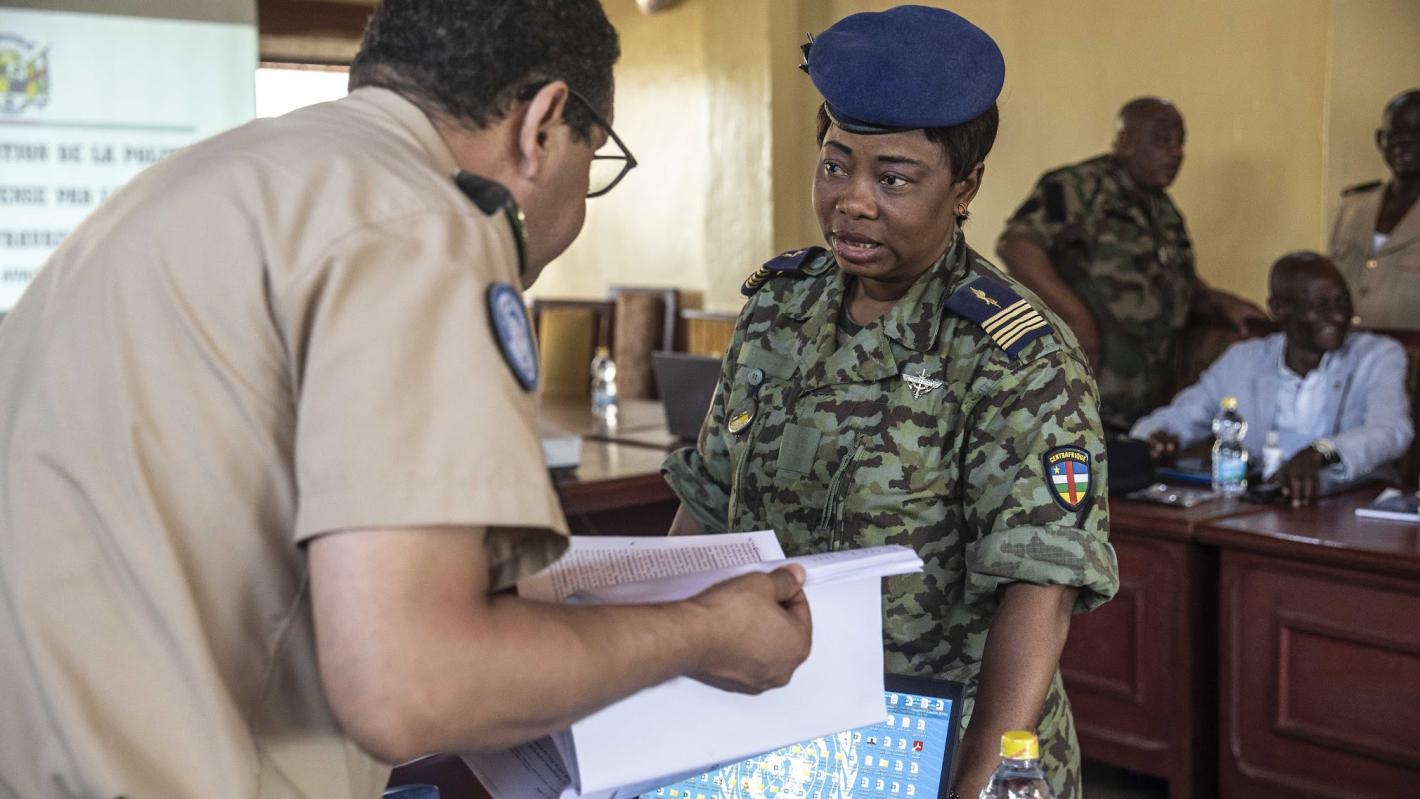
Strengthening Security, Governance, and the Rule of Law in the CAR
Through its Security Sector Reform (SSR) Service, MINUSCA supports the Central African authorities in implementing key policies and strategies aimed at restoring and extending State authority, strengthening good governance, promoting a responsible, transparent, and inclusive security sector, and combating human rights violations and impunity. In coordination with UNPOL, UNDP, other Mission sections, UN agencies, and international partners, MINUSCA/SSR contributes to modernizing command structures, strengthening democratic oversight, and improving the performance of security institutions.
MINUSCA/SSR plays an essential role in the design, adoption, and implementation of strategic documents guiding the reform and governance of the security sector. Key milestones include:
- National Security Sector Reform Strategy (SNRSS) (2022–2027)
- National Security Policy (PNS) (2022–2027)
- National Defense Policy (PND) (2024–2040)
- National Defense Strategy (SND) (2025–2030)
MINUSCA/SSR has also provided technical and financial support for the development of the National Border Management Policy (PNGEF) and its 2024–2033 Action Plan, currently under implementation, aimed at securing borders, strengthening cross-border cooperation, and promoting socio-economic development in border areas.
Now, MINUSCA/SSR is supporting the drafting of the Military Programming Law (LPM) 2026–2030, designed to plan the human, material, and financial resources required for the development of the Central African Armed Forces (FACA) and the Gendarmerie.
In partnership with UNPOL and UNDP, MINUSCA/SSR is also supporting the National Development and Capacity-Building Plan for the Internal Security Forces (ISF) 2026–2030, including the deployment of ISF units and crime prevention measures.
MINUSCA/SSR places particular emphasis on strengthening internal and external oversight bodies to ensure transparency, accountability, and efficiency in the security forces:
- General Inspectorate of the National Armed Forces (IGAN): Institutional support leading to the revision of its legal framework (Presidential Decree of 29 July 2025), expanding its mandate, doubling the number of inspectors, and enhancing its budgetary autonomy. Material, logistical, and technical assistance is also provided to enable regular inspection missions in the regions.
- Military Justice: Strategic support, in collaboration with the Justice and Corrections Section, including awareness-raising and training activities, dissemination campaigns for the Military Justice Code, and the rehabilitation of key infrastructure such as the Permanent Military Tribunals in Bangui (2023) and Bouar (2025), as well as disciplinary facilities.
Beyond this institutional support, MINUSCA/SSR plays an active role in democratic oversight of the defense and security forces and in experience-sharing among various internal oversight bodies (IGAN, general and central inspectorates of the Police, Gendarmerie, Water and Forestry services, Customs, and judicial services) and external oversight bodies (High Authority for Good Governance, Council of State, and the National Assembly through its Defense and Security, Finance and Budget, and Legal Affairs Committees). This synergy is fostered through the organization of annual retreats bringing together all these oversight actors to harmonize control practices and strengthen institutional coordination.
MINUSCA/SSR works in close collaboration with:
- Relevant Central African ministries: Defense, Interior and Public Security, Territorial Administration, Water and Forests
- Internal and external oversight bodies: general and central inspectorates, Council of State, High Authority for Good Governance (HABG), and the National Assembly
- Mission sections: UNPOL, Force, Justice & Corrections, Human Rights Division, Gender and Women’s Protection Advisers
- UN agencies and international partners: UNDP, UN Women, EUTM-RCA, bilateral partners
These actions are also part of the implementation of the security provisions of the 2019 Peace Agreement, the Luanda Roadmap, the RESA, the United Nations Sustainable Development Cooperation Framework (UNSDCF), and SDG 16.
In conclusion, MINUSCA’s SSR Service plays a key role in promoting security policies in the Central African Republic, with a focus on the transition to a garrison army, strengthening oversight mechanisms, securing border areas, improving the military justice system, and protecting civilians. These efforts aim to consolidate the gains of security sector reform and ensure their alignment with national and regional priorities.

